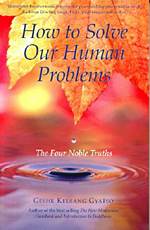Geshe Kelsang Gyatso is a highly respected meditation master and scholar of the Mahayana Buddhist tradition who was born in Tibet. Since arriving in the West in 1977, he has worked tirelessly to establish a pure Buddhakarma by establishing 600 Kadampa Meditation Centers and groups throughout the world. He is the author of 19 books including The New Meditation Handbook: Meditations to Make Our Life Happy and Meaningful.
He begins this edifying volume with a cogent exploration of The Four Noble Truths, discussing desire, suffering, origins, cessations, and the path. At the core of it all is this understanding: "When things go wrong in our life and we encounter difficult situations, we tend to regard the situation itself as our problem, but in reality whatever problems we experience come from the side of the mind. If we were to respond to difficult situations with a positive or peaceful mind they would not be problems for us; indeed, we may even come to regard them as challenges or opportunities for growth and development. Problems arise only if we respond to difficulties with a negative state of mind. Therefore, if we want to be free from problems, we must transform our mind."
The second section looks at patience. Geshe Kelsang Gyatso quotes the eighth century Buddhist saint Shantideva:
There is no evil greater than anger,
And no virtue greater than patience.
Therefore, I should strive in various ways
To become familiar with the practice of patience.
Getting angry solves nothing and only brings more suffering and disappointment to ourselves and others. A story illustrates this point: "The story is told of an old woman who used to argue and fight with everyone. She was so disagreeable that eventually she was expelled from her village. When she arrived at another village the people there asked her, 'Why did you leave your home?" She replied, 'Oh, all the people in that village were wicked; I left in order to escape from them.' The people thought it odd that a whole village should be so bad, and concluded that it was the old lady herself who was at fault. Fearing that she would cause them nothing but trouble, they threw her out of their village as well."
With great skill, Geshe Kelsang Gyatso explains the faults of anger and the three kinds of situations in which we need to learn to be patient: learning to accept suffering, thinking about Dharma, and trying not to retaliate. "Patient acceptance not only helps us," he adds. "It also helps those with whom we are patient. Being accepted feels very different to being judged. When someone feels judged, they automatically become tight and defensive, but when they feel accepted they can relax, and this allows their good qualities to come to the surface. Patience always solves our inner problems, but often it solves problems between people as well." It sounds too simple, but he makes a very convincing case that patience is indeed the way to solve human problems.
